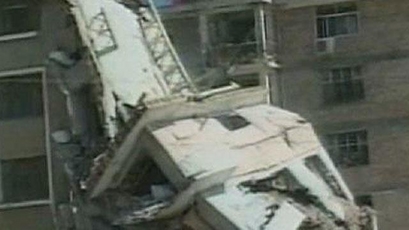1,300 missing in China amid widespread Asia floods
ZHOUQU, China – Rescuers dug through mud and wreckage Monday searching for 1,300 people missing after flash floods and landslidesstruck northwestern China, just one of a series of floods across Asia that have killed hundreds and spread misery to millions more.
In Pakistan, frustrated victims railed against the government's anemic relief effort for the estimated 15 million displaced by the country's worst-ever floods, while rescuers in mountainous Indian-controlledKashmir raced to rescue dozens of stranded foreign trekkers and find 500 people still missing in flash floods that have killed 140.
Sunday's disaster in China's Gansu province killed at least 127 people and covered entire villages in water, mud and rocks.
Vehicles carrying aid supplies choked the road Monday over bare, eroded mountains into the remote county seat of Zhouqu. Bodies wrapped in blankets were collected and laid on truck beds, although the government had not updated the death toll since Sunday night.
"There were some, but very few, survivors. Most of them are dead, crushed into the earth," said survivor Guo Wentao. Associated PressTelevision News showed the bodies of his younger brother and sister, wrapped in quilts, being carried away on a stretcher as crying relatives followed.
Work was under way to restore power, water and communications. It was not known how many of the missing were in danger or simply out of contact.
More rain is expected in the region through Tuesday morning, the China Meteorological Administration said on its website.
Hoping to prevent further disasters, demolitions experts set off three sets of charges to clear debris blocking the Bailong River upstream from the ravaged Zhouqu, which remained largely submerged following Sunday's disaster.
The blockage had formed a 2-mile (3-kilometer)-long artificial lake on the river that overflowed in the pre-dawn hours, sending deadly torrents crashing down onto the town. Houses were ripped from their foundations,apartment buildings shattered, and streets covered with a layer of mud and water more than a yard (meter) deep.
This area of China is known to be prone to landslides, worsened by deforestation, erosion and the weakening of cliff faces by the massive 2008 earthquake that struck Sichuan province just to the south.
Authorities were rushing in water, tents, blankets and other emergency supplies, and Premier Wen Jiabao flew to the area on Sunday to oversee relief efforts.
State broadcaster CCTV showed Wen comforting victims. At one point he was shown calling out to people waiting to be pulled from their buried home, saying: "Don't move! We're getting you out."
China's worst flooding in a decade has killed more than 1,100 people this year, with more than 600 still missing. The floods have caused tens of billions of dollars in damage across 28 provinces and regions.
In Pakistan, victims' frustrations showed no sign of dissipating as heavy rains continue to raise water levels in the country's swollen rivers, displacing thousands of additional people every day. Rising national anger has been directed at an already unpopular government that has deployed thousands of soldiers to save victims and deliver meals but has been overwhelmed by the scale of the disaster that has killed at least 1,500.
Manzoor Ahmed, 25, was one of thousands of people who fled their homes in Sindh province in the south, which was first inundated several days ago, more than a week after the floods devastated the northwest.
"It would have been better if we had died in the floods as our current miserable life is much more painful," said Ahmed, who spent the night shivering in the rain after he fled with his family from the town of Shikarpur.
Thousands of Pakistanis in the neighboring districts of Shikarpur and Sukkur camped out on roads, bridges and railway tracks — any dry ground they could find — often with nothing more than the clothes on their backs and perhaps a plastic sheet to keep off the rain.
"I have no utensils. I have no food for my children. I have no money," said Hora Mai, 40, sitting on a rain-soaked road in Sukkur along with hundreds of other people. "We were able to escape the floodwaters, but hunger may kill us."
A senior government official in Sukkur, Inamullah Dhareejo, said authorities were working to set up relief camps in the district and deliver food to flood victims.
But an Associated Press reporter who traveled widely through the worst-hit areas in Sindh over the past three days saw no sign of relief camps or government assistance.
Meanwhile, the death toll from flash floods in the remote desert mountainsides in Indian-controlled Kashmir rose to 140 with the recovery of eight more bodies overnight, police said Monday. The dead included five foreigners, but their nationalities were not immediately known. An estimated 500 more people were missing.
Further east, thousands of army, police and paramilitary soldiers continued clearing roads to reach isolated villages in the Ladakh region cut off by Friday's powerful thunderstorms.
The efforts were hampered by overnight rains, said army spokesman Lt. Col. J.S. Brar.
On Monday, Indian air force helicopters evacuated 36 stranded foreign tourists from Zanaskar, a popular trekking area.
Another 100 foreigners are likely to be airlifted later Monday to Leh, Ladakh's main town, Brar said. Zanaskar is nearly 125 miles (200 kilometers) west of Leh.
About 2,000 foreign tourists were in Ladakh, a popular destination for adventure sports enthusiasts, when the storm hit Friday, burying homes and toppling power and telecommunication towers.
___
Associated Press writers Ashraf Khan in Sukkur, Pakistan, and Aijaz Hussain in Indian-controlled Kashmir contributed to this report.
http://news.yahoo.com/s/ap/20100809/ap_on_re_as/as_asia_floods



Tidak ada komentar:
Posting Komentar